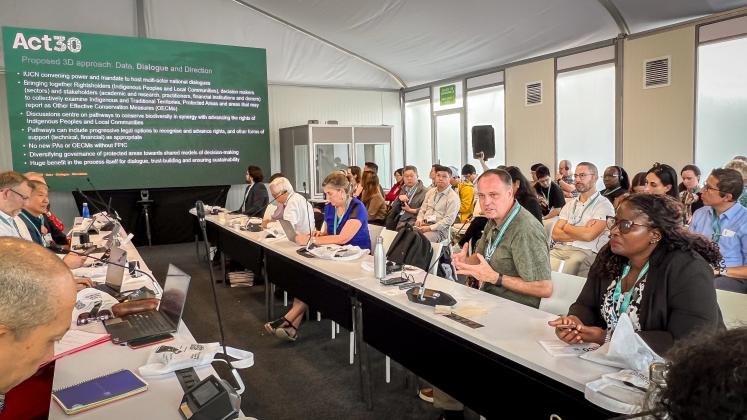On 22 October 2024, UNU-IAS co-hosted a side event of the 2024 UN Biodiversity Conference (CBD COP16) in Cali, Colombia, which explored how landscape approaches contribute to implementing the Kunming–Montreal Global Biodiversity Framework (GBF). The event discussed initiatives that support integrated and whole-of-society strategies, providing practical guidance and tools.
Suneetha Subramanian (Research Fellow, UNU-IAS) presented the publication Using Landscape Approaches in National Biodiversity Strategy and Action Planning, produced by UNU-IAS and the Institute for Global Environmental Strategies (IGES). This practical guide is designed to facilitate the integration of landscape approaches into National Biodiversity Strategies and Action Plans (NBSAPs) — essential instruments for countries to achieve the goals and targets of the GBF.
The event featured initiatives such as ACT30, which is designed to scale up conservation approaches through combining scientific evidence and traditional knowledge, and the 1000 Landscapes for 1 Billion People project, promoting large-scale, integrated landscape management to address global biodiversity and climate challenges. CDP shared insights from its expanding work on landscape strategies. The number of companies reporting engagement in landscape approaches has surged from 27 to 235 between 2020 and 2023, a trend that is expected to continue. Unilever highlighted its Action Agenda on Regenerative Landscapes, which focuses on regenerative land management practices that enhance biodiversity, promote resilience and reconcile social, economic and environmental objectives.
Panelists reflected on how landscape approaches can facilitate implementation of the GBF and contribute to the broader sustainability agenda. Zakri Abdul Hamid (Founding Chair, IPBES / Founding Director, International Institute of Science Diplomacy and Sustainability, UCSI University, Malaysia) emphasized the need for policy forums such as the Convention on Biological Diversity (CBD) to be advised by those who have knowledge and experience of landscape approaches. He praised the International Partnership for the Satoyama Initiative (IPSI) for providing a platform for organizations to share their experience and insights on the conservation and sustainable use of biodiversity.
About Landscape Approaches
Landscape approaches are landscape governance strategies that consider the ecological, social and economic context of a particular area, aiming to harmonize human activities with biodiversity conservation. Based on collaboration across sectors and scales, these approaches promote sustainable land-use practices, ecosystem restoration and community engagement to achieve conservation outcomes compatible with local livelihoods and economic development.





